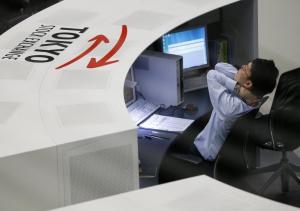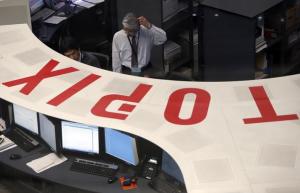NEW YORK (Reuters) - Stocks and the U.S. dollar slumped and safe-haven government debt rallied on Wednesday, as investors around the globe resumed their flight from riskier assets after weak U.S. and Chinese inflation figures.
Selling in stocks appeared panicky at the open on Wall Street, with major indexes down more than 2 percent early in the session. Markets cut losses in half but indexes remained at multi-month lows.
Markets churned as investors worried about a number of issues: slowing global growth and how central banks will respond, a glut of oil supply that has slammed crude futures, and the Ebola outbreak.
"You couple this (weak data) with fears about the spread of Ebola, with the recent downtrend and what we had today, the mindset has been a flight to safety and cash is certainly a safe place to be in," said Andre Bakhos, managing director at Janlyn Capital LLC in Bernardsville, New Jersey.
Flight from risk resulted in a massive rally in U.S. Treasuries, pushing the 10-year note's yield as low as 1.865 percent, its lowest since May 2013. Declining bond yields and sharp moves in U.S. federal funds futures contracts showed investors now believe the U.S. Federal Reserve is unlikely to raise rates in 2015.That view fueled a selloff in the dollar. [USD/] Soft U.S. retail sales and inflation data fed the view that the Fed would delay its first rate hike, which weighed on the U.S. currency.
"Weak retail sales, re-assessment of the Fed outlook, and all-time high (U.S. dollar) long positions - dangerous cocktail right here," said Jens Nordvig, strategist at Nomura FX Global.
China's consumer inflation slowed more than expected in September to a near five-year low, adding to concerns that global growth is cooling fast.
Prices paid by U.S. businesses also fell in September, as falling energy prices meant receding inflation concerns.
"The outperformance of the dollar over the past several months was largely related to the expectation that growth would outperform in the U.S.," said Brian Daingerfield, currency strategist at the Royal Bank of Scotland in Stamford, Connecticut.
"The concern that U.S. growth momentum will slow has been heightened," he said.
The euro (EUR=) was last up 0.8 percent against the dollar at $1.2754, just below a three-week high of $1.2885 hit earlier in the session. The greenback lost 0.7 percent against the yen (JPY=) at 106.27.
At the same time, risk aversion pulled money into U.S. and German government debt, pushing the U.S. benchmark yield to a session low below 2 percent, its lowest in 16 months and 10-year Bund yields
Benchmark 10-year notes
The MSCI All-Country World index was down 0.9 percent and European stocks (.FTEU3) tumbled 2.6 percent.
The Dow Jones industrial average (.DJI) fell 195.71 points, or 1.2 percent, to 16,119.48, the S&P 500 (.SPX) lost 21.93 points, or 1.17 percent, to 1,855.77 and the Nasdaq Composite (.IXIC) dropped 41.75 points, or 0.99 percent, to 4,185.42.
Another Texas healthcare worker has tested positive for Ebola, Texas officials said Wednesday.
Worries about Ebola slammed airline stocks. The CDC said the second nurse who was diagnosed had been on a plane the day prior.
Spot gold prices (XAU=) rose for the sixth time in the last eight sessions with the help of the weaker dollar, but copper prices (CMCU3) tumbled 2 percent.
Brent and U.S. crude futures were little changed, a day after their biggest daily drop in years. Brent (LCOc1) rose 0.1 percent to $85.15 a barrel while U.S. crude lost 0.2 percent to $81.66.
Emerging markets were also hit with Russia's rouble (RUB=) falling to its weakest level on record, while Russian government 10-year yields hovered near a five-year high and shares in Moscow (.IRTS) fell to close near a seven-month low hit last week.
(Additional reporting by Chuck Mikolajczak, Sam Forgione, Michael Connor, Richard Leong and Yasmeen Abutaleb; Editing by David Gregorio)
- USA News
- Finance
Stocks slump, bonds rally as global growth fears mount


No comments:
Post a Comment